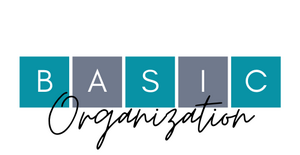5 Steps to Protecting a Collection
We all have a collection (or two). Even me!
From my perspective, it’s NOT OK to collect, for the sake of just having things. But it’s OK to have a collection. What’s the difference, you ask? In my mind, a collection is a group of items you gather together and take care of and it’s things you love. To collect is to keep things without meaning or usefulness.
A collection is a select number of any one type of item that you take pleasure in owning. 61% of us accumulate items of a similar nature (coins, toys, trading cards, jewelry) according to a 2022 survey by Magnify Money by Lending Tree. Being a responsible collector means taking care of your collection, especially if you want it to retain value over time.
Here are 5 things you need to do to take care of a collection:
Organize
A detailed inventory is a good tool when you need to assess the value of your collection. Whether you create a spreadsheet of information or use a service or app, it should include a description of each item, with measurements and flaws, and note where you purchased it and what you paid. Some inventory applications that you may want to check out are Artifcts, HomeZada, Sortly, or Pinventory. to name a few. There are many of them out there, so do some research to find the right one for you.
Accurately Value
You should know the general worth of your collection. An easy way to do this is to search for recently completed transactions on eBay for the same or similar items. If you want to work with a professional, find an appraiser through the Appraisers Association of America or the American Society of Appraisers. Expect to pay a flat or hourly fee to work with an appraiser.
A few things to note
- Know the difference between an appraisal for fair market value or replacement value.
- You may want to get items graded, which means evaluating the condition each item is in.
Proper Storage
Where you store your collection is important. Look for a cool, dry, and dark place. But, your basement may not be the best storage option. The humidity in some basements may cause mold or mildew, so run a dehumidifier to protect your items from damage. Even if you want to display your collection it’s important to preserve their value when displayed. There is a great book called Saving Stuff, written by Don Williams, a Smithsonian Senior Conservator that covers how to preserve a wide variety of collections.
You should also store receipts and the original packaging, since these may make your items more valuable. so consider how much space you will allot for storage when starting a collection.
Keep Clean
Be very careful with how you clean your collection. Again, a little research may go a long way to not making a mistake with cleaning products that could degrade your items. Even refinishing and repairing an item could lessen its value if you want to sell it in the future. Now, if you want to use the item, then go ahead and make it functional. I say enjoy those things that you love and make more memories around them.
Plan for the Future
Who will inherit your collection in the future? If one of your children loves the same kind of collecting you do and wants your collection, then count yourself lucky. Most of the younger generation isn’t interested in the same things. either way, your heirs will benefit from all the information you have gathered about your items. Make sure you note in your estate plan which person should be gifted your collection. Write down why it’s important to you, what they might do with it, and where/how they might liquidate the collection.
What Not To Do
Don’t stress over the value of your collection. The going price of anything fluctuates with time, so it can be unpredictable. My advice to you is, if you think your collection is valuable and you are saving it for your kids, take the time to sell it now. Don’t leave that project to someone else.
Bottom Line
Care for items while they are in your possession, but if they no longer bring you joy then sell, gift, or donate and let someone enjoy it.
Subscribe by email
Enter your email address to subscribe to this blog and receive notifications of new posts by email.
Janet Schiesl

Janet has been organizing since 2005. She is a Certified Professional Organizer and the owner of Basic Organization.
She loves using her background as a space planner to challenge her clients to look at their space differently. She leads the team in large projects and works one-on-one with clients to help the process move quickly and comfortably. Call her crazy, but she loves to work with paper, to purge what is not needed and to create filing systems that work for each individual client.
Janet is a Past Board Member of the National Association of Productivity and Organizing Professionals and a Past President of the Washington DC Chapter of NAPO were she has been named Organizer of the Year and Volunteer of the Year.

Janet Schiesl
Janet has been organizing since 2005. She is a Certified Professional Organizer and the owner of Basic Organization.
She loves using her background as a space planner to challenge her clients to look at their space differently. She leads the team in large projects and works one-on-one with clients to help the process move quickly and comfortably. Call her crazy, but she loves to work with paper, to purge what is not needed and to create filing systems that work for each individual client.
Janet is a Past Board Member of the National Association of Productivity and Organizing Professionals and a Past President of the Washington DC Chapter of NAPO were she has been named Organizer of the Year and Volunteer of the Year.

My father has an extensive corkscrew collection. It is actually very cool. He has it displayed on three giant wooden panels he built. They are displayed in his kitchen, and make for great conversation with guests. Each one has a number, and he has a corresponding journal where he tracks where the corkscrew came from and when, along with anything he knows about it.
We definitely need to update the insurance, as well as figure out what will happen to it when he is gone. I think he has shown me how to really get the most out of a collection!
Seana, sounds like your dad has done a great job. I love it when people display a collection. I’ve never seen a corkscrew collection!
I like the definition you provide. It’s helpful to know what a collection is as so many people are collectors. I have a collection of small porcelain boxes. It was originally my mother’s. I added to it when she was alive because I knew she loved those miniatures. I have them displayed on several small shelves in the guest room. I think your advice to sell a collection is good, if you know that no one in the family will want it or care for it. Sometimes (as in the case with my collection) it’s not so much the value of the items as it is the joy looking at it and caring for it bring.
When you inherit a collection, I think often it’s about honoring the memory of the person who owned the collect is important. Sounds like you’ve done a great job honoring your mother.
I have collections, but over the years, I have reduced them to a curio cabinet. Over time, I found that some of these items had little value, and I got rid of the ones I no longer cared for. It’s important that people understand how much work it takes to keep a collection. Thanks for sharing your thoughts.
You are welcome. I don’t collect much, but many years ago I decided to collect small glass chickens that are salt bowls (I know weird). I loved the colored glass. I told my sister about my interest and suddenly she was collecting them for me. For me, collecting for the sake of collecting is not the idea. I wanted a story about where I was when I purchased each one. I stopped collecting them then.
Excellent points. My family isn’t one for collecting, though both my sister and I “accidentally” starting collecting things (she, elephants; me, cows) because people saw we each had one and kept buying us gifts that fit the theme. Neither of us acquired items purposefully, which is a hallmark of a true collection. However, we’ve both extricated ourselves for the situation.
However, if I were to collect something, I agree that I would follow all of your points, especially proper inventorying and appraising of the items in question. I love that you differentiated between fair market value and replacement value, as novices may not know to specify one vs. the other in an appraisal situation. And, more importantly, it reminds people of the necessity of insuring collections that have monetary, and not merely sentimental, value.
Hi Julie. I told a story in my comment to Sabrina similar to yours. Why do people think they need to collect for someone else? It’s all about the find and the story that goes with it for me.